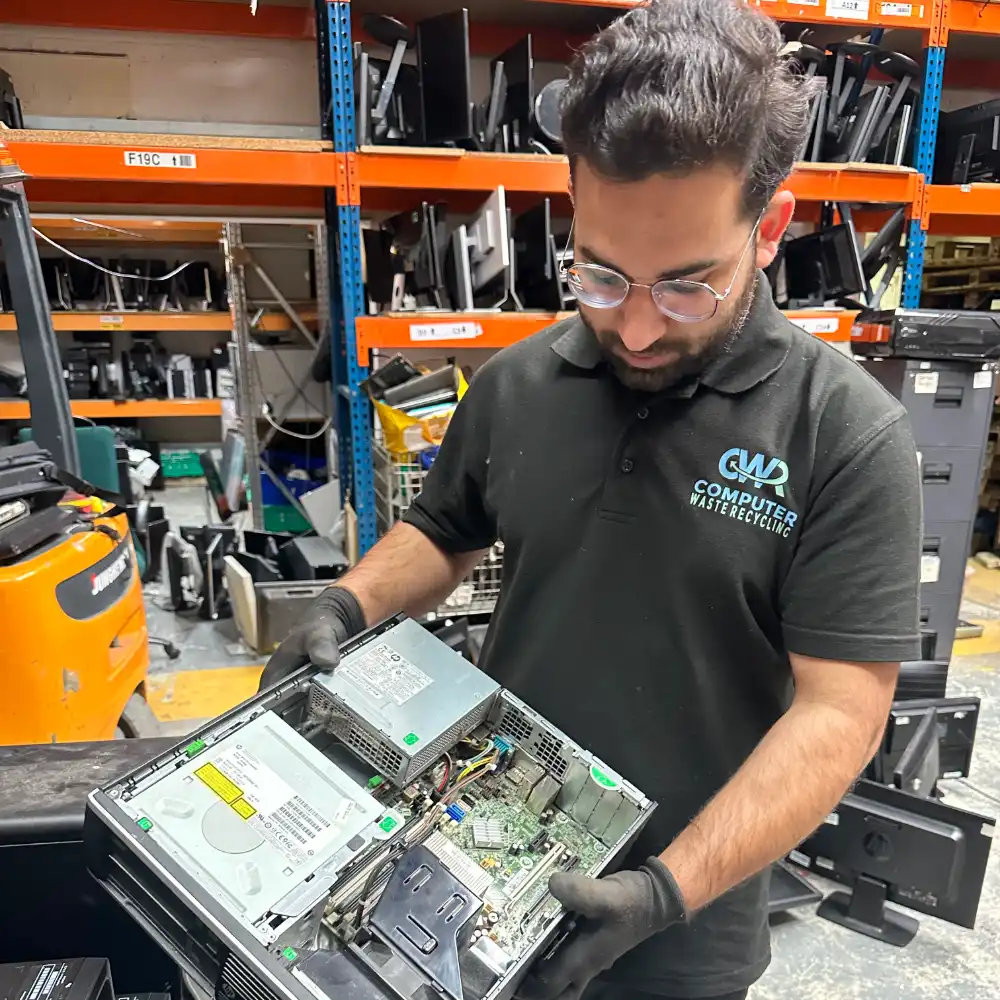Introduction
The rapid advancement of technology has led to Computer Disposal an increasing number of outdated computers and electronic devices. Proper computer disposal services are essential to protect the environment and ensure secure IT asset disposal. Without responsible disposal, old computers contribute to the global e-waste crisis, posing severe environmental and data security risks. This article explores sustainable, eco-friendly electronics recycling options and highlights the best practices for secure computer disposal.
What Is Computer Disposal?
Definition of Computer Disposal
Computer disposal refers to the process of getting rid of old or unwanted computers in a responsible manner. This can involve recycling, refurbishing, or securely destroying data before disposal.
Disposal vs. Recycling
While disposal may imply simply throwing away old computers, e-waste recycling near me services focus on repurposing components and reducing landfill waste. Certified e-waste disposal companies ensure that electronics are properly dismantled and valuable materials are reused.
Why Improper Disposal Is Harmful
- Toxic chemicals (e.g., lead, mercury, and cadmium) can contaminate the environment.
- Data breaches occur when hard drives aren’t securely wiped before disposal.
- Landfills accumulate non-biodegradable electronic waste.
Growing Problem of E-Waste
Statistics on Global E-Waste
- Over 50 million metric tonnes of e-waste are generated annually worldwide.
- Only 17% of e-waste is properly recycled.
- Improper disposal leads to environmental degradation and public health concerns.
Environmental Impact of Electronic Waste
- Air and soil pollution from hazardous materials.
- Increased carbon footprint due to improper recycling methods.
- Harm to wildlife and ecosystems from electronic waste dumping.
Laws and Regulations on Computer Disposal
Governments worldwide enforce e-waste laws, including:
- WEEE Directive (EU): Requires proper recycling of electrical waste.
- RCRA (USA): regulates hazardous e-waste management.
- State-level e-waste laws mandate businesses to recycle IT equipment.
Secure Computer Disposal: Why It Matters
Data Security Risks with Improper Disposal
Old computers contain sensitive information that can be retrieved if not securely erased. Cybercriminals often target discarded IT equipment.
The Importance of Secure Data Destruction
Data destruction and computer recycling should go hand in hand. Methods to ensure secure disposal include:
- Hard drive shredding: Physically destroying the drive.
- Data wiping software: Securely erases data beyond recovery.
- Degaussing: Uses magnetic fields to erase data.
Best Practices for Safe & Green Computer Disposal
Steps to Prepare Old Computers for Disposal
- Back up important data.
- Remove and wipe hard drives.
- Identify certified e-waste recyclers.
Finding Certified E-Waste Recyclers
Look for certifications such as:
- R2 (Responsible Recycling)
- e-Stewards (Certified Ethical Recycling)
Corporate & Business Computer Disposal Solutions
IT Asset Disposition (ITAD) for Companies
Businesses require IT equipment recycling solutions to handle bulk electronic waste securely.
Sustainable E-Waste Policies for Businesses
- Implement recycling programs.
- Partner with certified e-waste disposal companies.
- Educate employees on sustainable computer disposal options.
Certified E-Waste Recycling Companies
What to Look for in a Certified Recycler
- Compliance with legal regulations.
- Safe data destruction methods.
- Commitment to sustainability.
Top Eco-Friendly E-Waste Disposal Services
- Best Buy Recycling (USA)
- Dell Reconnect Program
- E-Cycle Washington
Local vs. Online Computer Disposal Services
Benefits of Local Drop-Off Recycling Centers
- Convenient and cost-effective.
- Supports community recycling initiatives.
Mail-in E-Waste Disposal Services
- Allows for nationwide recycling.
- Often includes free shipping labels.
Legal & Environmental Regulations on E-Waste
Understanding State & Federal E-Waste Laws
Failure to comply with e-waste recycling laws can result in fines and penalties.
Common Mistakes in Computer Disposal
Top Mistakes to Avoid
- Throwing computers in the trash.
- Not wiping personal data before recycling.
- Choosing unverified recyclers.
Eco-Friendly Alternatives to Disposal
Donating Old Computers to Charities
Many organisations refurbish and donate old computers to schools and nonprofits.
Refurbishing and Repurposing Old Devices
- Convert an old PC into a media server.
- Use parts for DIY electronics projects.
Finding Buyback Programs
Companies like Apple and Dell offer trade-in options for used electronics.
Cost of Computer Disposal Services
Free vs. Paid Disposal Options
- Many retailers offer free e-waste recycling.
- Businesses may need to pay for secure IT asset disposal.
Factors Affecting Pricing
- Quantity of devices.
- Secure data destruction services.
- Location and availability of recycling centres.
Future Trends in E-Waste Recycling
Advancements in Computer Recycling Technology
- AI-driven sorting for efficient recycling.
- New chemical processes for extracting valuable metals.
Rise of Circular Economy Models
- Focus on reusing and repurposing IT assets.
- Companies are designing computers with longer lifespans.
Conclusion
Proper computer disposal services are essential for both data security and environmental sustainability. Choosing eco-friendly electronics recycling solutions and certified e-waste disposal companies ensures responsible handling of old IT equipment. By following best practices, businesses, and individuals can contribute to a cleaner planet and sustainable computer disposal options.
FAQs on Computer Disposal Services
1. What is the best way to dispose of an old computer?
The best method is through certified e-waste disposal companies that ensure safe recycling and data destruction.
2. How can I securely delete data before recycling?
Use data wiping software like DBAN or opt for hard drive shredding.
3. Are computer disposal services free?
Some retailers and organisations offer free recycling, while secure IT asset disposal services may charge a fee.
4. Can I donate my old laptop instead of recycling?
Yes, many nonprofits accept functional laptops for refurbishment and donation.
5. What certifications should I look for in a recycler?
Ensure they have R2 or e-Stewards certification.
6. Is computer disposal legally required?
In many regions, businesses must comply with state and federal e-waste laws.
